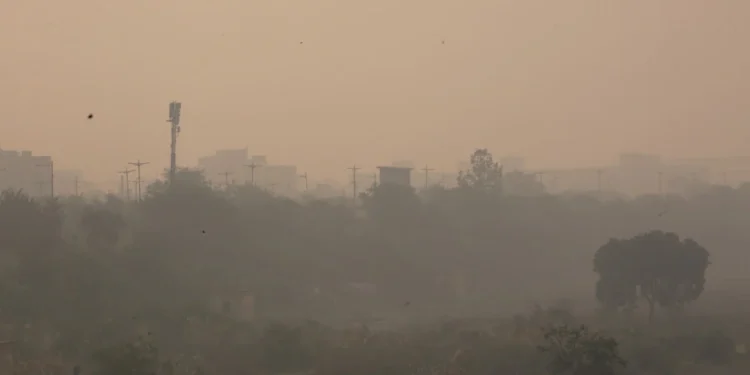Lagatar24 Desk
New Delhi: A dense layer of smog blanketed Delhi and its adjoining NCR regions on Monday morning, pushing the city’s air quality into the ‘very poor’ category once again. According to the Central Pollution Control Board (CPCB), Delhi’s Air Quality Index (AQI) stood at 345 at 8 a.m., a slight improvement from 391 on Sunday, yet still far above safe limits.
AQI Levels Across the Capital
Most monitoring stations recorded AQI between 300 and 400, signaling extremely poor to severe pollution. The Anand Vihar area registered 379, ITO 375, Punjabi Bagh 324, Wazirpur 397, and Rohini 390. Bawana crossed into the severe zone at 412. In the NCR, Faridabad (312), Ghaziabad (318), Greater Noida (325), Gurugram (328), and Noida (310) all reported ‘very poor’ conditions. The CPCB defines AQI values between 301–400 as very poor, 401–450 as severe, and above 450 as severe-plus.
Visuals of Smog and Limited Visibility
Videos shared from Akshardham and Barapullah Bridge showed thick haze reducing visibility to just a few meters. Akshardham’s AQI touched 479, while Lodhi Road stood at 314, prompting civic authorities to spray water to suppress dust and pollutants. The India Meteorological Department (IMD) warned that the overall air quality is likely to remain in the ‘very poor’ range over the next few days.
Authorities Hold Off on GRAP Stage 3 Restrictions
Despite worsening air quality, the Commission for Air Quality Management (CAQM) decided not to invoke GRAP Stage 3 curbs for now, citing a marginal improvement. GRAP-3 restrictions include a ban on private BS-III petrol and BS-IV diesel vehicles, non-essential construction, and a shift to hybrid learning for students up to grade five. Officials said the situation will be reviewed continuously as the pollution trend develops.
Public Protests and Health Concerns
On Sunday, residents and children staged peaceful protests near India Gate, holding placards that read “Smog se Azadi!” and “Breathing is killing me.” They demanded immediate government action to tackle pollution and implement a clean-air policy. Police detained some demonstrators for assembling without prior permission, but no violence was reported. Protesters called the situation a “public health emergency”, urging authorities to prioritize long-term solutions over temporary fixes.







